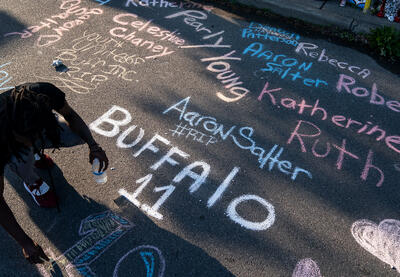We can’t talk about hard history or our struggle against anti-democratic policies and systemic racism without talking about the horrific, premeditated attack in Buffalo, New York. Anti-Black terrorism has a long history in our nation, one that we must confront. But we must consider, too, the mental health of Black people in this moment.
On May 14, we learned of yet another race massacre in the United States. In Buffalo, New York, 10 people were killed—and three others injured—by a white supremacist who’d traveled for hours with the sole purpose of murdering Black people. Ruth Whitfield, Roberta Drury, Aaron Salter, Heyward Patterson, Pearly Young, Geraldine Talley, Celestine Chaney, Katherine Massey, Margus Morrison and Andre Mackneil are now among the extremely long list of souls taken by racist acts. Their ages ranged from 32 to 86.
Media reports and commentary often discuss racial violence as fringe, extremist, or note that the killer dealt with mental illness—which stigmatizes another vulnerable group. But these shootings are not the result of a fringe movement. The ideology espoused by such hate is also expressed in mainstream spaces such as conservative media outlets and on the U.S. House and Senate floors. Whether online or on Capitol Hill, these views yield silencing efforts around teaching honest history, voter suppression and a rollback on civil rights.
Racism Has Always Wracked Our Nation
The racial reckoning of 2020 has been met by a renewed entrenchment of white supremacist ideology in the U.S. and a rush to implement regressive laws, with the goal of maintaining the status quo and reinforcing a society that centers whiteness. This year, we’ve seen numerous anti-CRT, anti-LGBTQ, and anti-immigrant legislation and policies, and threats to reproductive rights—all of which have devastating effects on Black and other marginalized communities. Indeed, these are aimed at harming the most vulnerable among us. The violent attack in Buffalo springs from the same poisoned source as these policies and practices that serve to thwart real democracy.
Acts of violence against Black people and other historically marginalized groups continue because we have yet, as a nation, to be honest with ourselves about the source of such suffering.
A family member of one of the Buffalo shooting victims summed it up this way in an Associated Press report: “America’s Achilles’ heel continues to be … racism.”
We can’t discuss what happened in Buffalo without acknowledging historical context. Racist shootings don’t happen in a vacuum. These acts of terror against Black people have a long history. The fear of an inclusive multiracial and multicultural society is a common thread that weaves throughout the January 6 Insurrection, the 2015 murders in Charleston, South Carolina, and all the race massacres—those documented and those not—that occurred throughout the 19th and 20th centuries.
Understanding historical context is critical if we are to dismantle white supremacy and end senseless violence. We must teach and learn the connections between current events and the hard histories of local communities across our nation. If we don’t acknowledge the history of anti-Black violence—not only those instances that are well-known but also diverse local history stories—we fail to properly understand the extent of this trauma for Buffalo and for Black communities across this nation. Without truth, we can’t achieve healing.
We just can’t talk about Buffalo without talking about hard history. Let us not forget and simply move on.
Say ‘No’ to Neutrality
The people who yearn for an oppressive society—where white supremacy reigns—are in the minority. However, they hold enough power to create or uphold discriminatory laws that are baked into every U.S. institution, making it harder to unravel inequities and injustices. In addition, too many people who do not espouse white supremacist views aren’t moved to action. There is danger in complacency from people who may think they are not directly affected by racism. And this moment calls for an all-hands-on-deck approach to achieving a truly just society.
We must say ‘no’ to neutrality. We must all do whatever we can—through offering resources and additional kinds of support, through educating ourselves honestly, through legislative efforts, and through ensuring equal access to the ballot box—to stop this trajectory of terror. There is no middle ground of justice. There shall be no concessions made when demanding equal rights. And most importantly, we will not debate whether a human is worthy of life, love and freedom.
Hold Space for Black People in this Moment
Whether they are your students, teachers, colleagues, friends, family, neighbors or yourself—hold space for Black people right now. What happened in Buffalo is a trauma to a community that has experienced a history of such traumas. Respect that.
Holding space means being present in the moment—physically, emotionally, and mentally—for someone, supporting them without judgment, and giving them a safe place to share their feelings. It might mean listening to those who want to talk while giving space and quiet to those who need it.
